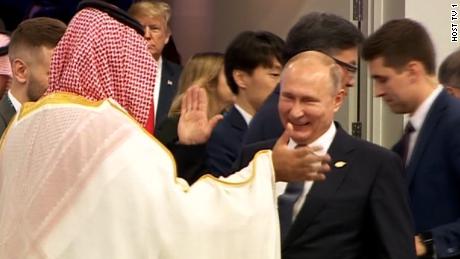Moscow (CNN)
Over the past year, special counsel Robert Mueller's investigation has circled closer to President Donald Trump, surfacing new revelations about links between Russia and people in the President's orbit during the 2016 campaign and transition.
Russian President Vladimir Putin, by contrast, had a good 2018.
In March, the Russian President sailed to a re-election victory, winning a fourth term by a handsome margin. Putin's victory was never in doubt, but the Kremlin was able to come close to the high turnout numbers it sought to secure a broad mandate.
But the main event of the year for Putin was not overtly political. In June and July, Russia hosted the 2018 FIFA World Cup, a monthlong sporting event that was a resounding triumph for Putin.
More than 3 million fans attended matches in 12 stadiums across Russia. FIFA's Technical Study Grouppraised the Russia tournament as the "best FIFA World Cup to date," writing, "There has been widespread recognition that it was achieved, even by those who once doubted that Russia might be the right place to stage the most important sporting event in the world."
The World Cup ended with a 4-2 victory for France over Croatia. But the clear winner was Russia.
The games allowed Russia to put its best foot forward after years of increasing political isolation and confrontation with the West following the 2014 annexation of the Black Sea peninsula of Crimea and the imposition of economic sanctions.
The atmosphere in Moscow was a case in point: The Russian capital got a major facelift before the World Cup. Muscovites were treated to the unusual sight of beer-drinking and revelry on the main boulevards. It was a contrast to March 2017, when street demonstrations in the capital and around Russia, organized by Russian opposition leader Alexey Navalny, prompted a major police crackdown.
Major protests -- or a much-feared terrorist incident -- did not mar Putin's World Cup. And the Russian leader also used the World Cup to advance his own diplomatic charm offensive. At the opening game between Saudi Arabia and Russia, Putin played host to Saudi Arabia's Crown Prince Mohammed bin Salman. Russia and Saudi have a budding energy alliance, but the World Cup bolstered personal ties between the Crown Prince and the Kremlin leader.
That personal connection has continued to pay dividends: At the recent G20 summit in Buenos Aires, the two leaders shared a very public high-five, underscoring their personal rapport.
Never mind that Putin was snubbed at the G20 by Trump amid the fallout from the Kerch Strait incident. For Putin, such visuals matter. Russia is still locked in a confrontation with the United States and the West, and Putin's appearances on the world stage allow him to play the role of global statesman, despite his country's political isolation.
That's important, because all is not rosy in Putin's Russia. The past year saw continued confrontation between Moscow and Washington: The war in Syria, Russian meddling in the 2016 presidential election and the Trump administration's plans to withdraw the US from the Intermediate-Range Nuclear Forces Treaty have all perpetuated an atmosphere of Cold War-style conflict.
Russia lost years of economic growth in the wake of the 2014 annexation of Crimea. The World Bank currently forecasts only modest GDP growth of between 1.5% and 1.8% between 2018 and 2020.
Russia's business leaders are wary of possible new sanctions that could further cripple the country's economy: US lawmakers this year proposed stiff new sanctions to punish Russia for its 2016 election interference, though such measures have yet to become law.
And then there was Putin's Salisbury problem. In September, Putin said the two suspects named by UK authorities over the poisoning of former Russian double agent Sergei Skripal and his daughter in the historic British city were not criminals and suggested the pair come forward.
They did, and what ensued was a major embarrassment for Russia's intelligence services: The investigative website Bellingcat revealed what it said were the real identities of the Russian agents allegedly involved in the nerve agent poisonings after the suspects appeared in an interview on Russia's state-owned RT network.
On the domestic front, Putin has also seen a dent to his popularity. While the country's beleaguered opposition did not take the spotlight away from the World Cup -- save for a brief pitch invasion by punk protest group Pussy Riot at the final match -- protesters gathered in cities around Russia after the World Cup to rally against a deeply unpopular government proposal to raise the country's retirement age.
The World Cup, then, provided a respite to Russia headlines that are consistently dominated by scandal, confrontation and conspiracy. And instead of a country that is often depicted in hammer-and-sickle stereotypes, visitors saw a country that could roll out the (unironically) red carpet.
"Many foreigners have learned about our culture and our cities, and they have met our openhearted people," Putin told reporters after the final match. "And millions of people -- not thousands but millions -- have changed their views on Russia. It is an achievement, a big achievement."

No comments:
Post a Comment